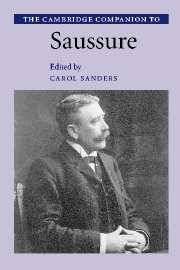Book contents
- Frontmatter
- Introduction: Saussure today
- Part I Out of the nineteenth century
- Part II The ‘Course in General Linguistics’
- 3 The making of the Cours de linguistique générale
- 4 The linguistic sign
- 5 Langue and parole
- 6 System, arbitrariness, value
- Part III After the Cours
- Part IV New debates and directions
- Notes
- Works by Saussure and further reading
- References
- Index
5 - Langue and parole
from Part II - The ‘Course in General Linguistics’
Published online by Cambridge University Press: 28 May 2006
- Frontmatter
- Introduction: Saussure today
- Part I Out of the nineteenth century
- Part II The ‘Course in General Linguistics’
- 3 The making of the Cours de linguistique générale
- 4 The linguistic sign
- 5 Langue and parole
- 6 System, arbitrariness, value
- Part III After the Cours
- Part IV New debates and directions
- Notes
- Works by Saussure and further reading
- References
- Index
Summary
Preliminary remarks on terminology in Saussure and in his commentators
Throughout the Cours de linguistique générale (inter alia 24, 25, 56, 119, 121, 129) the reader finds the terms opposition and dualité. Opposition is used in its general sense in the passages cited above but occurs elsewhere (167ff.) in a specific sense which brings it within the compass of one of the paired terms (différence/opposition) which shape the entire Cours de linguistique générale (henceforth Cours, CLG, or CGL in English), a sign's constituents, its form and its concept, being different from those of other signs for Saussure, but the sign as a whole being in opposition to other signs. In many commentaries on the Cours, the paired terms are themselves referred to as oppositions or dualities. While opposition is an apposite description of the relationship in which the terms in each pair stand to each other, i.e. a characterisation of the distinctiveness of the linguistic sign with respect to other linguistic signs, as defined in the text of the Cours (167), it is potentially misleading in its more general meaning, which can overshadow the Saussurean sense of distinctiveness by a suggestion of contrast or even of incompatibility. As for duality, though it does not entail the same problem, neither does it correspond to the sense in which Saussure uses dualité to denote a division inherent within the subject matter of linguistics itself (Hjelmslev's objet étudé), rather than in the analytical apparatus of the discipline. (See Gordon, 1996.)
- Type
- Chapter
- Information
- The Cambridge Companion to Saussure , pp. 76 - 87Publisher: Cambridge University PressPrint publication year: 2004
- 3
- Cited by



